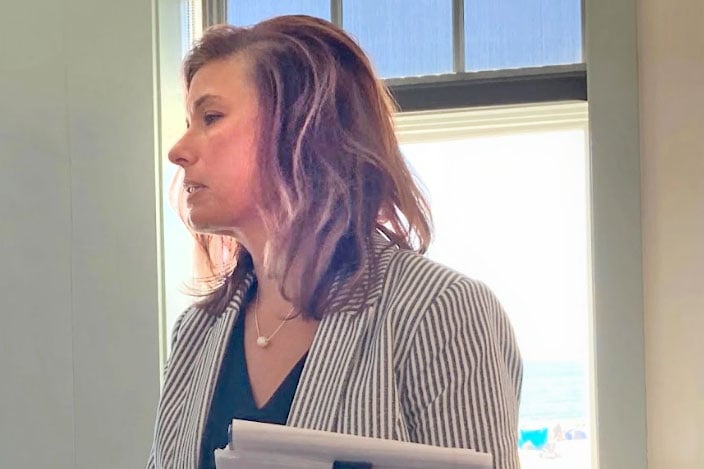NH company shines light on UV therapy for autoimmune conditions
Started in 2021, Cytokind describes itself as 'the global leader in using UVB light to treat immune disorders and improve survival and the quality of life for patients'

New Hampshire’s Executive Council confirmed Lori Weaver as the new commissioner of the Department of Health and Human Services last month. Weaver, who’s been with the department for 26 years, had served as the interim commissioner after Lori Shibinette stepped down from the role.
DHHS, the largest state agency in New Hampshire, is responsible for public health, mental health, youth, housing and other services.
Commissioner Weaver spoke with NHPR’s All Things Considered host Julia Furukawa about her priorities and goals as she settles into her new role.
Q. What are your biggest priorities right now?
A. Looking ahead, one of the things that’s really important for me as a commissioner is to make sure that as an agency, we are able to respond to the needs of those that we serve. We serve our most vulnerable people, our most vulnerable populations. As society changes, we don’t move as a bureaucracy as quickly as those needs change. So that’s a lot of my focus. I really want to be able to balance the continuous prioritization of needs and strategic direction, as well as being able to respond to the crisis that happens seemingly all too often.
Q. Has the state seen improvements in staffing?
A. We at the department have seen about a 5.5% drop in our vacancy rate. We were at about 22.5% in December. We’re now down to about 17%. So we have people that are coming in, people that are staying, for sure. Some of the pay raises helped with that. We know that our providers, with our Medicaid rate increases as well — that was helpful for (our staff in) mental health services or any of our providers. That has definitely been a good retention tool — as well as the bonuses for their recruitment. So, we’re seeing some dents, we’re seeing some moving in the right direction. We’re not staying stagnant.
Q. Recently, a report from the Office of the Child Advocate, a state watchdog for child welfare, raised some serious concerns about the placement of children in out-of-state facilities and its screening process for those facilities. Is the state planning to change anything related to that?
A. We’ve spent the last five years building a system of care for children, and it’s a good system of care. The challenge is that we don’t have a lot of workforce currently in the state. We have kids out of state right now. Last I checked, about 65 kids are out-of-state. But out of that 65, only 10 are beyond New England.
And it’s important to remember that we also have kids with complex medical and complex behavioral issues — we just don’t have services for them here in New Hampshire. What my department has is a responsibility to make sure that those children and families get services. So that’s part of what we’re charged with.
Whether the services are in New Hampshire or elsewhere, of course, we want to keep families in New Hampshire. That is the goal, the priority. But it isn’t always the case. And New Hampshire is one of the top states in reducing out-of-state placements across the country.
We just reduced our juvenile justice placements by 50%, and we’re the lowest that we’ve ever been.
Q. While the new youth development center is being built, what is the state doing to ensure that the children in its care now are being treated appropriately?
A. When the legislation passed back in this spring, part of that legislation approved what we call a therapeutic model. It’s really not so much a juvenile detention facility model as it is working with kids who have significant pasts in a more therapeutic setting. We don’t have to wait for the new facility to be built; we’re doing that now. So that’s really a clinical wraparound approach, working with these youth and hopefully (for them) to be rehabilitated and to be able to be reunited with their family or to have services out in the community.
Q. You’ve spent 26 years with the department. As the commissioner now, what do you hope the agency can accomplish under your leadership?
A. I think I’ve worked for seven commissioners, so I have that insider perspective of what works and what doesn’t.
I would like to be able to see our department be nimble and not be so slow to respond to society’s needs (as they) change. And that’s a real challenge to be able to do that, because bureaucracies don’t move at a rapid pace. I am planning on having a strategic direction, a strategic focus.
We need to have good partners. We need to have good relationships. We can’t, as the Department, provide all those services. Our providers do that, so we need to be better business partners.
Those are the things that I’m focusing on, as well as staff retention and having the department be a place that people want to be at. Our staff are mission driven, and they do great work and I want to keep them there. I want to keep them happy and making a difference.
This article is being shared by partners in The Granite State News Collaborative. For more information, visit collaborativenh.org.